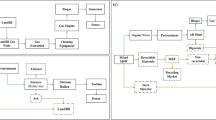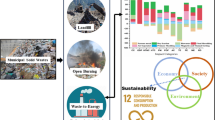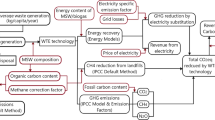Abstract
Landfilling is the main technology for municipal solid waste (MSW) disposal in Thailand. Semi-aerobic landfill and mechanical biological treatment (MBT) are the emerging options for MSW management. Nevertheless, their direct and indirect impacts on greenhouse gas (GHG) emissions are still unclear. In this study, life cycle analysis was used to analyze GHG emissions from three MSW management scenarios. For landfill options, three operating phases including transportation, landfill operation, and biodegradation from landfill were considered. The emissions from landfills operated under anaerobic and semi-aerobic conditions were evaluated using country-specific emission data. Meanwhile, MBT was considered with additional phases of refused derived fuel (RDF) production and transportation from landfill to power plant for electricity production. The results revealed a significant GHG emission reduction of 68% when replacing anaerobic landfills with semi-aerobic landfills. The use of RDF products in MBT options as power plant fuel could offset all emissions during their upstream phases yielding a positive impact in terms of GHG emission provided that the RDF was transported to power plants located within 150 km from the MBT plant. The study could be used to support the MSW management plan to achieve zero net emissions in the waste sector of the country.






Similar content being viewed by others
Data availability
The data that support the findings of this study are available from the corresponding author, [CC], upon reasonable request.
References
PCD, 2021. Municipal Solid Waste Situation in Thailand in 2020, Pollution Control Department, Ministry of Natural Resources and Environment, Thailand (In Thai).
PCD, 2021. Action Plan for Municipal Solid Waste Management, Pollution Control Department, Ministry of Natural Resources and Environment, Thailand (In Thai).
Kaza S, Yao L, Bhada-Tata P, Van Woerden F (2018) What a Waste 2.0: A Global snapshot of solid waste management to 2050. World Bank, Washington DC
Chiemchaisri C, Visvanathan C (2008) Greenhouse gas emission potential of the municipal solid waste disposal sites in Thailand. J Air Waste Manag Assoc 58:629–635
Omar H, Rohani S (2015) Treatment of landfill waste, leachate and landfill gas: a review. Front Chem Sci Eng 9(1):15–32
Asian Institute of Technology, 2004. Municipal Solid Waste Management in Asia, Asian Regional Research Program on Environmental Technology (ARRPET), Thailand.
Chiemchaisri C, Chiemchaisri W, Kumar S, Hettiaratchi JPA (2007) Solid waste characteristics and their relationship to gas production in tropical landfill. Environ Monit Assess 135:41–48
Office of natural resources and environmental policy and planning (2018) Thailand’s third national communication. Ministry of Natural Resources and Environment, Thailand
Yaman C, Anil I, Alagha O (2020) Potential for greenhouse gas reduction and energy recovery from MSW through different waste management technologies. J Clean Prod 264:121432
PCD, 2020. Guidelines for the Planning, Design and Operation of Semi-aerobic Landfill, Ministry of Natural Resources and Environment, Thailand (In Thai).
Sutthasil N, Chiemchaisri C, Chiemchaisri W, Wangyao K, Endo K, Ishigaki T, Yamada M (2018) The effectiveness of passive gas ventilation on methane emission reduction in a semi-aerobic test cell operated in the tropics. Waste Manag 87:954–964
Sutthasil N, Chiemchaisri C, Chiemchaisri W, Ishigaki T, Ochiai S, Yamada M (2020) Greenhouse gas emission from window pile for mechanical biological treatment of municipal solid waste in tropical climate. J Mater Cycles Waste Manag 22:383–395
Huang Q, Yang Y, Pang X, Wang Q (2008) Evolution on qualities of leachate and landfill gas in the semi-aerobic landfill. J Environ Sci 20:499–504
IPCC, 2006. IPCC Guidelines for National Greenhouse Gas Inventory. IGES, Japan.
Aziz SQ, Aziz HA, Yusoff MS, Bashir MJK (2010) Leachate characterization in semi-aerobic and anaerobic sanitary landfills: a comparative study. J Environ Manag 91:2608–2614
Sutthasil N, Chiemchaisri C, Chiemchaisri W, Wangyao K, Towprayoon S, Endo K, Yamada M (2014) Comparison of solid waste stabilization and methane emission from anaerobic and semi-aerobic landfills operated in tropical condition. Environ Eng Res 19:261–268
Clemens J, Cuhls C (2003) Greenhouse gas emissions from mechanical and biological waste treatment of municipal waste. Environ Technol 24(6):745–754
Xu C, Yang JX, Wand RS (2000) Life cycle assessment for municipal solid waste treatment and utilization. J Environ Sci 12(2):225–231
Liamsanguan C, Gheewala SH (2008) The holistic impact of integrated solid waste management on greenhouse gas emissions in Phuket. J Clean Prod 16:1865–1871
Kristanto GA, Koven W (2019) Estimating greenhouse gas emissions from municipal solid waste management in Depok, Indonesia. City Environ Interact 4:100027
Wang K, Nakakubo T (2020) Comparative assessment of waste disposal systems and technologies with regard to greenhouse gas emissions: a case study of municipal solid waste treatment options in China. J Clean Prod 260:120827
Chaya W, Gheewala SH (2007) Life cycle assessment of MSW-to-energy schemes in Thailand. J Clean Prod 15:1463–1468
Chen TC, Lin CF (2008) Greenhouse gases emissions from waste management practices using life cycle inventory model. J Hazard Mater 155:23–31
Thuppahige RTW, Gheewala SH, Babel S (2022) Environmental impact of organic fraction of municipal solid waste treatment by composting in Sri Lanka. J Mater Cycles Waste Manag 24:189–199
Grosso M, Dellavedova S, Rigamonti L, Scotti S (2016) Case study of an MBT plant producing SRF for cement kiln co-combustion, coupled with a bioreactor landfill for process residues. Waste Manag 47:267–275
Montejo C, Tonini D, Márquez MC, Astrup TF (2013) Mechanical biological treatment: performance and potentials. An LCA of 8 MBT plants including waste characterization. J Environ Manag 128:661–673
Tyagi VK, Kapoor A, Arora P, Banu JR, Das S, Pipesh S, Kazmi AA (2021) Mechanical-biological treatment of municipal solid waste: case study of 100 TPD Goa plant, India. J Environ Manag 292:112741
Liamsanguan C, Gheewala SH (2008) LCA: A decision support tool for environmental assessment of MSW management systems. J Environ Manag 87:132–138
Devadoss PSM, Pariatamby A, Bhatti MS, Chenayah S, Hamid FS (2021) Strategies for reducing greenhouse gas emissions from municipal solid waste management in Pakistan. Waste Manag Res 39:914–927
Liu Y, Sun W, Liu J (2017) Greenhouse gas emissions from different municipal solid waste management scenarios in China: based on carbon and energy flow analysis. Waste Manag 68:653–661
Inazumi S, Ohtsu H, Shiotani T (2011) Environmental assessment and accounting for the waste disposal stream in Bangkok, Thailand. J Mater Cycles Waste Manag 13:139–149
Menikpura, S.N.M., Sang-arun, J., Bengtsson, M., 2012. Mechanical Biological Treatment as a solution for mitigating greenhouse gas emission from landfills in Thailand. Proceedings of the ISWA World Solid Waste Congress 2012, 17–19 September 2012, Florence, Italy.
Siam Cement Group, 2018. Plant record of fuel (diesel) consumption for RDF transportation, personnel communication.
Chanchampee, P., 2010. Method for Evaluation of Waste Management in Thailand in Consideration of Policy, Environmental Impact and Economics. Ph.D. Thesis, Technische Universität Berlin, Germany.
Phitsanulok Municipality, 2015. Plant record of fuel (diesel) and electricity consumption of RDF production process, personnel communication.
IPCC, 2014. Climate change 2014: synthesis report. contribution of working groups I, II and III to the fifth assessment report of the intergovernmental panel on climate change. IPCC, Switzerland.
USEPA, 2017. Emission factors for greenhouse gas inventories. Available Source: https://www.epa.gov/sites/production/files/2018-03/documents/ emission-factors_mar_2018_0.pdf, November 9, 2019.
TGO, 2018. Thailand grid emission factor for ghg reduction project/ activity. Available Source: http://ghgreduction.tgo.or.th/images/Grid_ Emission_Factor_2559_-_Finalised.pdf, November 9, 2019.
Phitsanulok Municipality, 2019. Management of solid waste disposal center, Phitsanulok municipality, personal communication.
Acknowledgements
This research was carried out in collaboration between Kasetsart University (KU), King Mongkut's University of Technology (KMUTT), Thailand, and the National Institute for Environmental Studies (NIES), Japan.
Author information
Authors and Affiliations
Corresponding author
Additional information
Publisher's Note
Springer Nature remains neutral with regard to jurisdictional claims in published maps and institutional affiliations.
Rights and permissions
Springer Nature or its licensor (e.g. a society or other partner) holds exclusive rights to this article under a publishing agreement with the author(s) or other rightsholder(s); author self-archiving of the accepted manuscript version of this article is solely governed by the terms of such publishing agreement and applicable law.
About this article
Cite this article
Sutthasil, N., Chiemchaisri, C., Chiemchaisri, W. et al. Life cycle greenhouse gas emissions of emerging municipal solid waste management options: a case study in Thailand. J Mater Cycles Waste Manag 25, 662–673 (2023). https://doi.org/10.1007/s10163-022-01584-6
Received:
Accepted:
Published:
Issue Date:
DOI: https://doi.org/10.1007/s10163-022-01584-6




